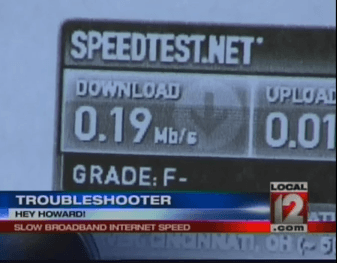Frontier Communications’ DSL service to some residents in Sardinia, Ohio has been progressively slowing down to the point Speedtest.net rated one man’s connection an “F-Minus.”
Larry Meeker’s broadband service from Frontier achieved speeds of just 190kbps — about four as fast as traditional dial-up Internet service. Upload speeds reached just 1kbps. When Meeker called Frontier Communications to complain about the lousy broadband speeds, he reports Frontier didn’t seem in any hurry to improve his service.
WKRC-TV TroubleShooter Howard Ain reports Frontier had done little for Meeker initially, saying “it will cost a lot of money for the company to upgrade” the broadband facilities in inherited from an acquisition from Verizon Communications.
Frontier changed its mind when Ain indicated the company’s broadband woes were about to be a feature item on WKRC’s 6pm local news. Meeker also told the station he was preparing to file a complaint with Ohio’s public utility regulator. Just a few days before the report aired, Frontier called Meeker to tell him improved service was on the way.
Meeker reports it used to take 10-15 seconds to load even basic web pages over Frontier’s DSL service. But after the company began work on Meeker’s connection, pages are loading much faster, usually after 1-3 seconds.
The Sardinia man noted the best way to get action out of Frontier might be to call the media to get the company to do the right thing.
“I’m very happy that it is so easy to contact Channel 12 news and Howard Ain and know that somebody is at least going to call you and if there is a problem they are going to check it out and investigate it,” Meeker told the station.
A spokesman for Frontier Communications blamed the old owner — Verizon Communications, for inadequate broadband facilities in place to serve Sardinia and surrounding areas. The company says it is spending $90 million on upgrades because people are using the Internet a lot more in the area. New circuits bringing additional capacity are anticipated to begin service by the second week of February.
[flv width=”360″ height=”290″]http://www.phillipdampier.com/video/WKRC Cincinnati Broadband Service 1-18-12.mp4[/flv]
WKRC TroubleShooter Howard Ain covers Frontier’s lack of performance in Cincinnati suburb Sardinia, Ohio. (2 minutes)


 Subscribe
Subscribe






